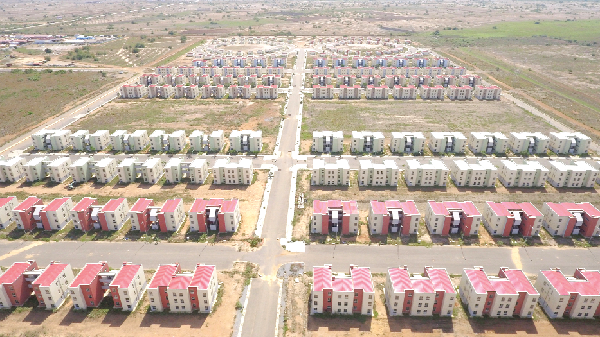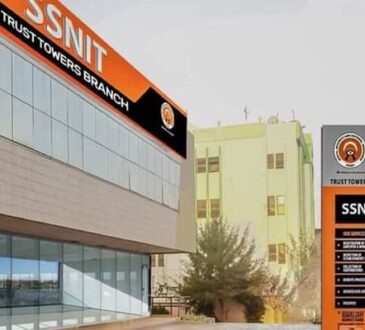The housing Infrastructural deficit gap, SUCASA Properties reposit to arrest the challenge

In our fast paced development drive as a developing country, population growth, migration – in the form of rural-urban drift, commercialization, and the search for employment opportunities in our urban centers have assumed an increasing trend of proportional growth.
These developments by themselves, are not inimical to civilization, industrialization and wealth creation – the imbalance that has unfortunately, placed a burden on the asymmetrical developments progression is our ability as a nation to expand our infrastructural development capacities.
The basic necessities of life include, shelter which brings into sharp focus our roles as industry players in buttressing the housing infrastructural deficit in particular, among the lot. Ghana’s housing infrastructural deficit index stands at 1.8 million according to the 2021 Population and Housing Census data of the Ghana Statistical Service. According to the Ministry of Works and Housing, the 2021 Population and Housing Census indicates, that 12.7% of the total housing structures are vacant with variations across the 16 administrative regions, and the reason for this development is because of high rise in housing prices and the absence of an affordable housing scheme as an alternative.
To position us as a nation to meet the challenges of the growing rate of our housing infrastructural deficit, it behooves the government to actively engage the private sector in its attempt to nip the challenge in the bud. Stakeholders, industry players, and investors in this purview, require a more resolute, innovative and modern approaches that fit the socio-cultural context of our own unique environment, and in a recently published video in our media streams, the CEO of SuCasa Properties Ghana in the person of Mr. Michael Kwabena Owusu O’Grantson-Agyapong has adequately elucidated brilliantly on the trajectory of these developments and the way out of this shame. Reference video publication link here: https://youtu.be/UCqQuZq56Yw
THE CHALLENGES
With the rising cost of living, globally experienced, most of the factors of production have equally been badly affected with price hypes. Cost of building materials have their daily undulating turns, and determines to a high extent, the unit price of our housing infrastructural project as a nation. Where such matters have not been prudently, handled with best economic management schemes, the supply chain and cost effects have always landed on the finished product, thereby, resulting in the astronomical rise in home unit prices.
To compound the situation, however, investors and real estate managers have not been able to design a scheme of making housing repayment options economically friendly for the already plagued citizenry – the set rigid payment plans have almost always become uncomfortable for consumers to subscribe and acquire home properties for themselves and their families, and even the middle class is challenged by this financial obligation.
Our socio-cultural practice of using middle men, many of whom, highly unscrupulous to engage the market demand for housing is itself, a major deterrent, as many a people have ended up been victims of such unscrupulous middlemen activities in the supply chain management of our housing infrastructural needs.
The land management and acquisition system has itself suffered undue pressure from litigations, traditional and chieftaincy ownership involvements – all the way to the notorious “land guards” practice. Perhaps the Land Act, 2020 ( Act, 1036) would help address the land acquisition encumbrances to a large extent if fully implemented to the core. So individuals, investors, real estate managers and many other stakeholders have had to contend with these inhibitions in our drive to radically expand our housing infrastructural development projects as a nation; this development is simply unhealthy for our overall purposeful agenda in arresting the housing deficit index.
High profit maximization motives by real estate investors, coupled with the people’s limited budgetary capacities towards housing infrastructural acquisition is a problem for the system. That notwithstanding, certain crops of people have resorted to using a rather inferior construction materials in order to bridge the vacuum in our seriously unmet housing infrastructural needs – the negative repercussions have been rather unbearable on our urbanization development drive, climate change and the Sustainable Development Goals (SDGs) Goal 13 of the United Nations.
Lastly, we could touch on the limited technological advancement in the real estate and construction projects across the length and breadth of the fabric of the society, and without such state of the art technological innovations, our traditional approach to providing housing solutions to the rising demands has met a stiff block.
SUCASA HAS THE SOLUTIONS
As a stakeholder, consultantium, investor, problem solver and technical housing engineer, SUCASA PROPERTIES is advantageously positioned to handle these matters with economically, technologically, and socially engaging approaches such as outlined below:
A) SuCasa is stocking on materials to avert the challenges of global fluctuation of prices of construction materials.
B) SuCasa is prudently and efficiently using economic models such as the referral systems to incentivize these middlemen in order to mitigate the unscrupulous practices in the supply chain management including the referral and agent fee methods.
C) SuCasa is rolling out its affordable housing scheme, which will help in pushing over 2000 units of houses on the market annually.
D) They are committed to a much more due diligence on documentation and processing of their properties for acquisition.
E) They are radically expanding their estate construction projects by building townhouses in communities across the nation, and not just concentrating on the cities, and maximizing the use of land instead of the traditional style of building individual homes.
F) SuCasa provides safety and security for your homes, because they are able to beat cost through their bulk purchases of logistical items, that guarantee quality standards and value for money.
SUCASA’S POSITIVE IMPACT ON THE REAL ESTATE MARKET AND THE GENERAL POPULACE
The statistics indicate, that between 1950 – 2010, of the half a decade, Ghana’s housing deficit suffered an increasing trend from 1 million to 2.8 million. However, with government and private sector interventions, there is an improved reversal trend of the deficit by 33% between 2010 and 2021, according to the Ghana Statistical Service 2021 report on Population and Housing Census.
This makes SUCASA’s timely appearance and innovative interventions very relevant on the dynamics of the demographics of our housing deficit:
1. With their affordable housing scheme, the populace can now enjoy their 100% Guaranteed Cash Back policy; a more trustworthy, flexible and friendly housing acquisition scheme.
2. The monotonous rent challenges bedeviling the general populace, especially, those in urban centers is set to become a thing of the past.
3. Their housing affordability scheme would offer economic relief to homeowners
4. City planning and engineering for development is favorably impacted as they observe radical city and town planning regulations and government policies in this respect.
5. Productivity is going to be enhanced as the housing challenges and their ramifications on communication, health, and mobility is arrested through their radical interventions.
6. Eventually, peace and security shall improve, and this condition is a prerequisite for Foreign Direct Investment, which in itself, helps, boost economic growth and development through job creation and wealth creation to the detriment of the unemployment menace bedeviling the economic fortunes of the country.
6. With their eco-friendly and viable economic, technological and social initiatives, they aptly present themselves as the obvious giants unparalleled on the market and pacesetters for other industry players in the real estate business.
7. Finally, their Corporate Social Responsibility remarkably and appreciably, enjoy a lot of social integration, cohesion and goodwill engagements from among the communities of our society.
8. In a nutshell, at SuCasa, they build green in line with the climate change advocacy of the global body – United Nations’ Sustainable Development Goal 15
SUCASA, BUILDING ON TRUST!
BY: DANIEL KOFI AWUKU-ASARE (PRO, SUCASA PROPERTIES)







